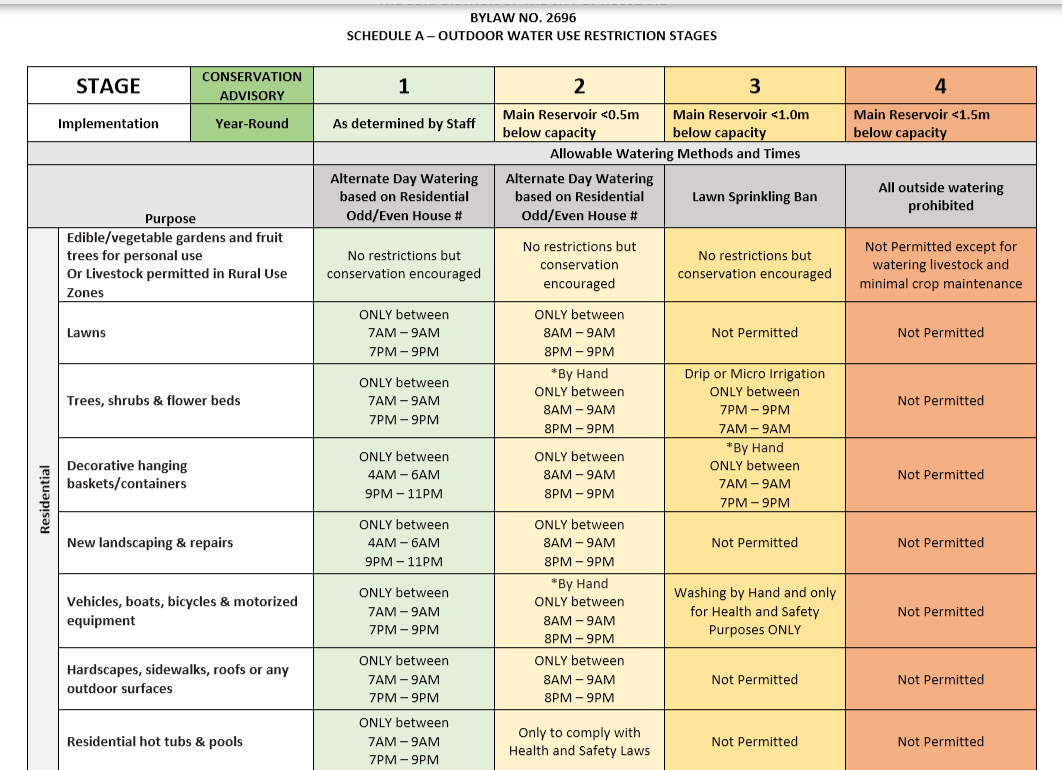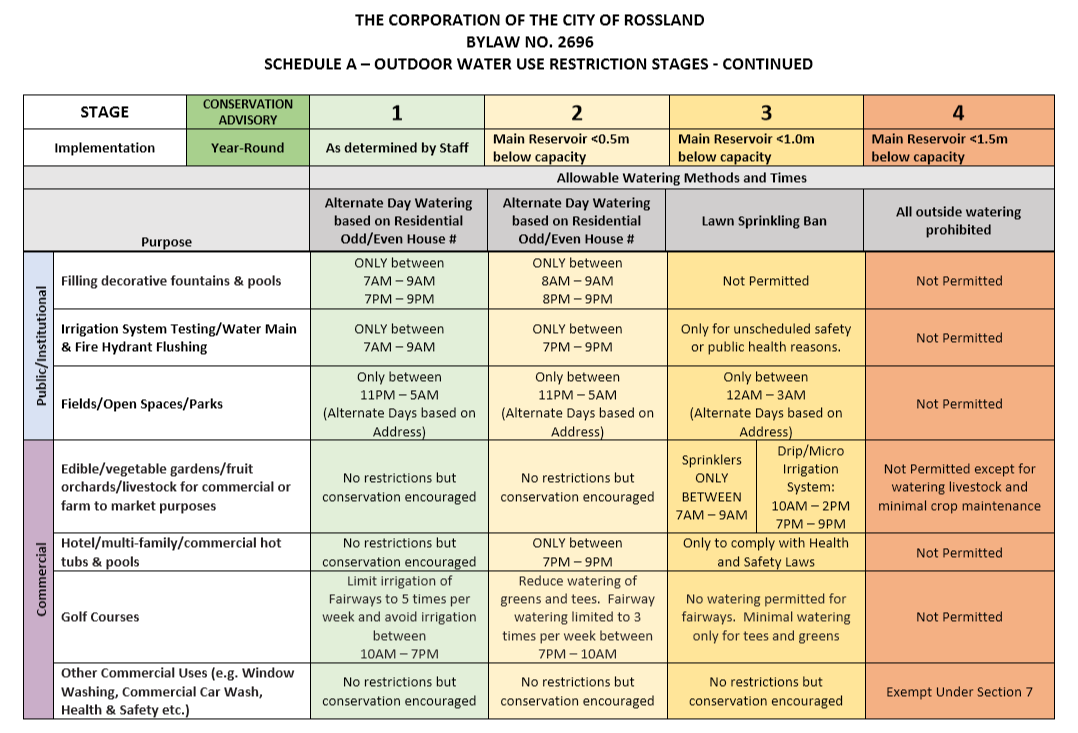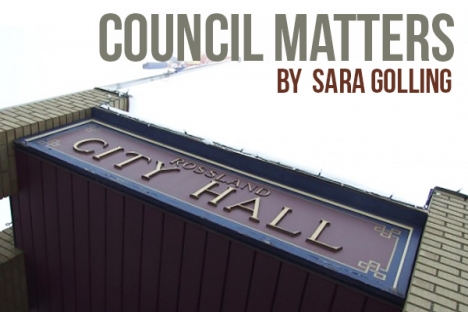‘Smart’ meters, the Arena, the Skatepark, new Watering Rules, the High Cost of Sewage, and more!
Rossland City Council Regular Meeting, April 15, 2019
Present: Mayor Kathy Moore, and Councillors Janice Nightingale, Andy Morel, Scott Forsyth, Chris Bowman, Dirk Lewis, and – by telephone – Stewart Spooner.
Public Input Period:
John Howse spoke, objecting to the City’s installation of “Smart” water meters. He objected to the amount of data that can be collected by the meters, such as how many people are in a household, and much more – which, he said, can be used by third parties. He characterized it as a “surveillance system” and an invasion of privacy. CFO Elma Hamming indicated that she would send him another response about his security concerns.
[Editor’s note: Hamming provided a response to the security and privacy issue, and shared it. It appears at the end of this report.]
Miche Warwick spoke about the proposed new water restrictions; she thought the new restrictions were much better, but still unfair to food producers. The proposal for stage three conditions, when there is a complete ban on sprinkling lawns and other unnecessary outdoor uses, says, for home food production, “no restrictions but conservation encouraged.” Commercial growers face timing restrictions in Stage Three. And for stage four, when outdoor water use is prohibited for all except food production and “exempt” uses, food growers can still use just enough water for “minimal crop maintenance.” (See chart below this report.) Warwick compared the water use of the “exempt” users – which include commercial car washes and window washers, but do not include food producers – with the amount of water needed to produce a large amount of local food.
Caley Mulholland spoke on behalf of the Rossland Skatepark Association to express strong interest in applying for an outdoor revitalization grant to complete the landscaping; there is still much work to be done there, including a shade gazebo.
Council adopted the minutes and the recommendations of its Committee-of-the-Whole meetings (on the City’s strategic plan and recommendations for CIP grants) held on April 4, as well as the previous regular meeting.
Bylaws:
a) Zoning Amendment Bylaw #2693: A motion to ADOPT the bylaw rezoning 1988 First Avenue from R1 Short-term Rental back to R1 Infill Residential CARRIED unanimously.
b) A motion to give second and third reading to the 2019 – 2023 Financial Plan Bylaw #2694 CARRIED unanimously.
c) A motion to give first, second and third readings to the Municipal Tax Rate Bylaw #2695 CARRIED unanimously.This bylaw sets out the tax rates necessary to raise the amount of money needed for the City’s budget.
d) Outdoor Water Use Regulation Bylaw #2696:
Staff recommended a new regime for water conservation, imposing different rules for different specified uses. Vegetable gardens for personal use and crop-raising for commercial use have different rules, and watering of lawns is subject to more restrictions than watering food crops. The proposed new bylaw and regulations don’t impose restrictions based on set dates, but rather on water supply. “Wasting” water is defined, and is an offense, as is any other non-compliance with the bylaw. The bylaw also provides for enforcement, and allows City staff to enter onto properties to determine compliance with the bylaw, and institutes a $100 fine “for each offense.”
Nightingale commented that she wants to give the bylaw first reading to “get the conversation going,” and get more detailed input from the local farmers. Morel commented that the bylaw has been well-thought out, and said that maintaining consideration of food production is important; he also noted that water storage can be helpful during the dry season. Lewis felt that the restrictions on agriculture should be eased. Forsyth agreed with another point Morel had made, that using treated water for crops is not optimal. Moore thanked staff for the huge improvement over the previous rules in the draft bylaw, and noted that giving it first reading is just a first step.
A motion to give the new bylaw first reading CARRIED unanimously.
Policy Review:
a) A motion to reconfirm the City’s Land Transaction Policy CARRIED unanimously.
b) Council reviewed the City’s Pesticide and Herbicide Use Policy and Lewis moved that the policy review be deferred to the May 21 meeting, when he’ll be able to provide more information on the issue. The motion to defer CARRIED unanimously.
c) Nightingale made a motion to amend the Recreation Facilities User Allocation Policy; but it FAILED unanimously. A motion to defer review of the policy CARRIED unanimously.
Staff Updates and Reports
Staff recommended that Council approve a request to hold a music festival at the Centennial Field in the summer of 2020. Morel spoke against the location, saying that a festival would do more damage to the field than the proposed damage deposit would cover, and that the underground irrigation system could be damaged. Moore likes the idea of the event, but agrees that the location is a problem. A motion to allow the proposal FAILED unanimously. Council expressed support for the concept, but unease about the location and the amount of the damage deposit. The applicant was in the gallery; he thanked Council for the helpful input and clarified that he would run the event through a not-for-profit organization – that it was not intended as a private, for-profit operation.
Council reviewed the 2019—2010 Youth Action Network (YAN) Workplan, and a motion to approve it CARRIED unanimously.
City to take over Skatepark Completion
Staff recommended that the City take over the completion of the skatepark, and the Rossland Skatepark Association explained that they have done as much as they think they can with regard to fundraising and volunteer work, and plan to wind down at the end of September this year. Staff recommends using the remaining funding in the budget to leverage a Resort Municipality Initiative grant to complete the remaining work.
A motion “that the City take over the project from the Rossland Skatepark Association (RSA) and the remaining funds of $20,000 to be applied to the balance owing from RSA, and absorb the amount owing of $13,091 which is provided for in the 2019 budget, AND THAT the City use the remaining $13,091 as leverage funds to apply for RMI grant funding to finish the Skatepark project offsetting the costs that have already been included in the 2019 budget” — CARRIED unanimously.
Council reviewed a YAN request to hold an all-ages event on June 15 at the Youth Space at the Skatepark, with live bands, food trucks, skateboard demos and a skate competition – NO alcohol sales, but with outdoor music to continue until 10:00 pm. A motion to approve the event as presented CARRIED unanimously.
Council reviewed the City of Rossland Strategic Plan for 2019 to 2022, as amended at the Committee-of-the-Whole meeting held on April 8. Amendments included striking “fun” from the City’s vision and replacing it with “diverse;” and adding strategic priorities of “Regional cooperation and Partnership” and “Environmental Sustainability,” which includes “Climate Leadership;” and adding affordability as a consideration in how the City grows. A motion to approve the amendments CARRIED unanimously, and Council will continue work to prioritize the actions identified for each goal.
The high cost of sewage:
Council reviewed the Regional District of Kootenay Boundary East End Regional Sanitary Sewer Service Stage 3 Liquid Waste Management Plan, and a motion to approve the plan CARRIED unanimously.
The plan is required to upgrade the area’s sewage treatment to secondary treatment, as – by law – primary treatment alone is no longer permitted. Council was provided with 298 pages of background information on the development of the plan; interested citizens can read it all in the Council materials for this meeting, from pages 133 to 331.
A grant opportunity: choices, choices …
The City has an opportunity to apply to Columbia Basin Trust (CBT) for a grant, for “outdoor multi-use community spaces.” Funding is available for both planning and creation. Four projects were considered – planning for completion of the North Jubilee Wetland Park; public washrooms for the downtown area; landscape finishing for the skatepark, except that the project has now been taken over by the Ctiy; and replacement of a children’s climbing structure in Irwin Park (RossGlen), including a shade pergola. Staff thought the latter two reflected the intent of the grant, with the RossGlen work being the best match.
A motion to approve a grant application for the RossGlen project FAILED unanimously; councillors expressed concern about the high cost of the proposed playground equipment, inter alia.
A motion to defer a decision on the grant application, and refer the question back to staff for more information, CARRIED.
Rossland’s Arena: What next?
As promised at the previous regular Council meeting, Manager of Public Works Darrin Albo submitted a report on the various options available to get the arena functional for the next winter season, with the estimated costs of each. He identified the recommended option as the “best long-term solution” but was not present to speak to it. The recommended option (#4) comes with an estimated price tag of about $350,000.
Forsyth moved that Council move to go with the least expensive option (#1). Nightingale argued that the $350,000 option (#4) added up to about $17,500 a year, for a 20-year expected lifespan, and improves public safety, and would use less energy over time, and lower operational costs. Lewis said he supports Option #4. Bowman also argued for Option #4. Morel was unwilling to spend the money before spending more time considering the whole issue of the arena’s long-term viability. Moore weighed in to support Option #1.
The motion to go with Option #1 CARRIED with Spooner, Moore, Morel and Forsyth in favour, and Lewis, Bowman and Nightingale opposed.
Motorcycle Tragedies on the increase:
The Mayor of the District of Kitimat wrote seeking a letter of support for a motion asking the provincial government to implement the final phase of the Graduated Licensing Program for Motorcycles, including power restrictions and mandatory training. The letter pointed out that motorcycles make up only 3% of BC’s registered vehicles, but are involved in 11% of motor vehicle fatalities.
Morel moved that the City support the concept and send a letter; the motion CARRIED unanimously.
Community Arts Plan
Rossland Council for Arts & Culture and other arts groups in Rossland are hoping to collectively create a Community Arts Plan. RCAC chair Renate Fleming penned a letter to the City, seeking about $1,100 of in-kind assistance and a contribution of $1000 to support the plan, which will be used to leverage other grants. A motion to grant their requests CARRIED with only Spooner opposed.
After Member Reports, the meeting adjourned, and your reporter hot-footed it home to unwind — warm cat on lap shedding hair everywhere – and feeling grateful for last year’s volunteer Russian Blue potato plant, because besides a copious harvest of lovely big purple potatoes last fall, it had produced another ten pounds or so of beautiful potatoes which were discovered and unearthed from deeper in the soil only a couple of days ago during initial garden-digging. Bonus bounty.
AND here’s CFO Elma Hamming’s statement on “Smart” water meters and the information they collect:
“Personal information that is collected in relation to the installation, maintenance, and operation of water meters is collected pursuant to 26(c) of the Freedom of Information and Protection of Privacy Act for the purposes of billing water customers, water system account management, and the operations and maintenance of the water meters. What that means is that the information cannot be used for any other purpose than the purpose for which it is collected and if it was, it would be in contravention of BC privacy laws. We have addressed the privacy concerns with the Office of the Privacy Commissioner and we are in compliance with BC laws, as well as having the cloud server hosted in Canada as further assurance to our customers.
“Utility customers could have a variety of reasons why they do not want to participate in LIVE metering and it is important that the City is transparent and consistent in how it responds to non-compliance.
“The method that has been applied in the past is that those customers who refuse to install a meter and be metered were charged a flat rate instead, as well as an additional fee for non-compliance, pursuant to the bylaw.
“If a customer chooses not to have the meter upgrade, the account will be non-compliant and the City will change your account to this flat rate, which includes a fee for non-compliance.
“Even though some customers may be willing to submit a manual reading, the City must not treat one customer differently than any of its other customers. If one customer were allowed to submit manual readings, we should be able to accept readings from other customers, and this is not in the best interest of the City or the best use of taxpayer dollars because it would require additional labour capacity and doesn’t provide the quality of data we are looking for in our asset management development.
“This technology was chosen so that we can better manage the infrastructure by identifying leak detection, educating consumers on water conservation to prolong the life of our asset infrastructure, and deferring water upgrades by being more efficient with the asset infrastructure.”
Below: charts of the DRAFT (proposed) new watering rules — NOT yet approved, and subject to change before adoption.


























